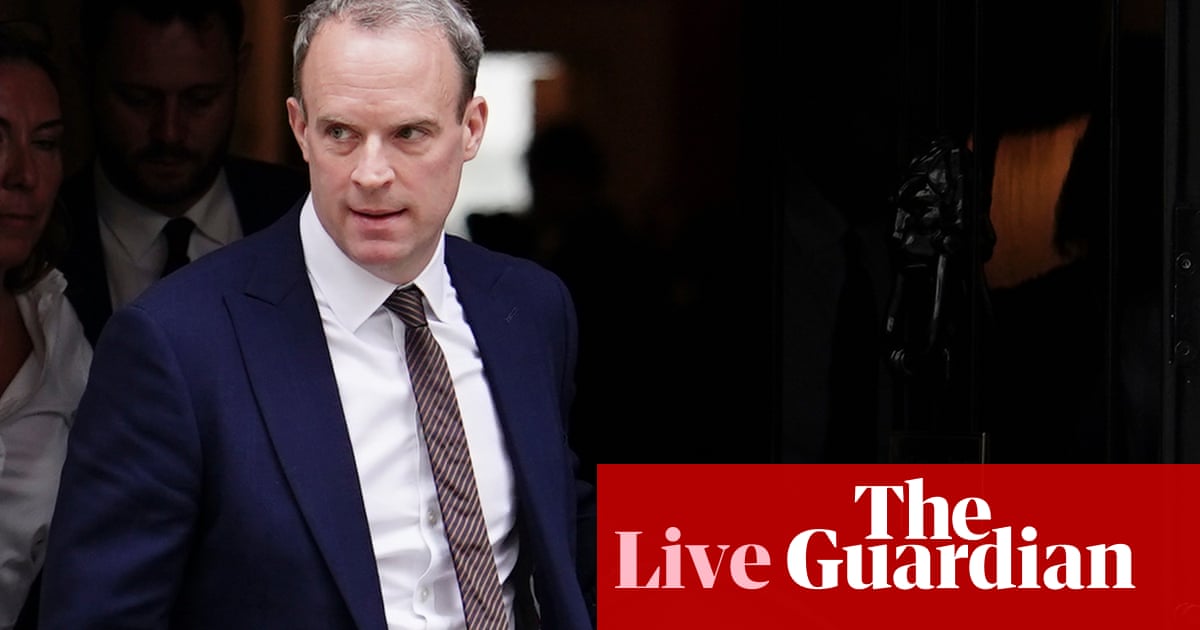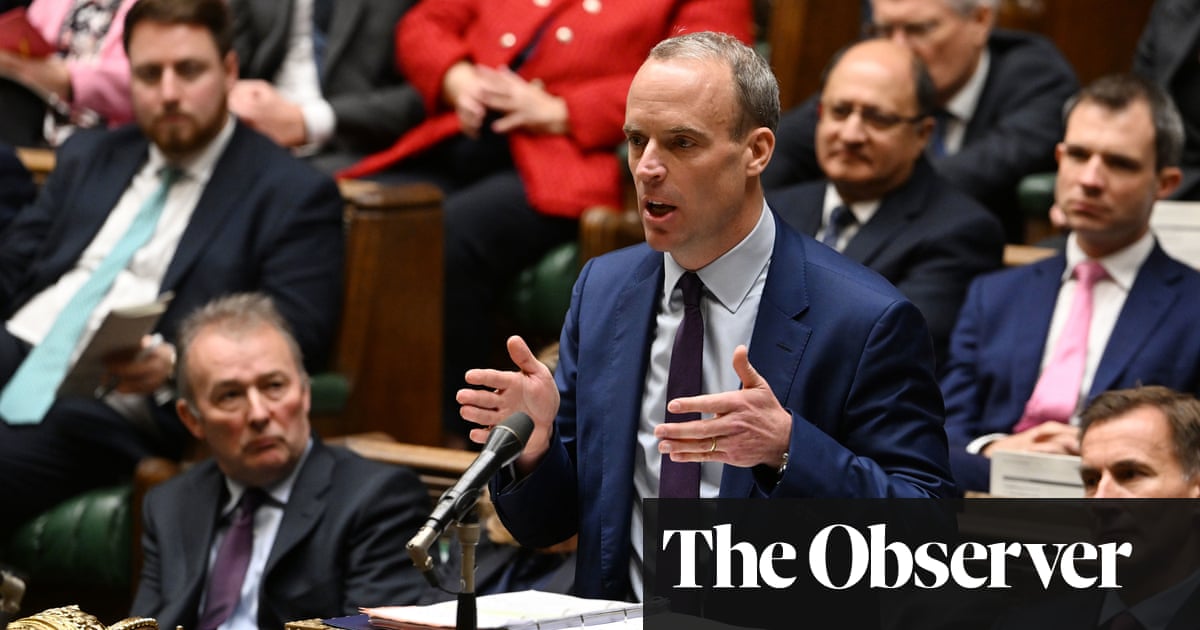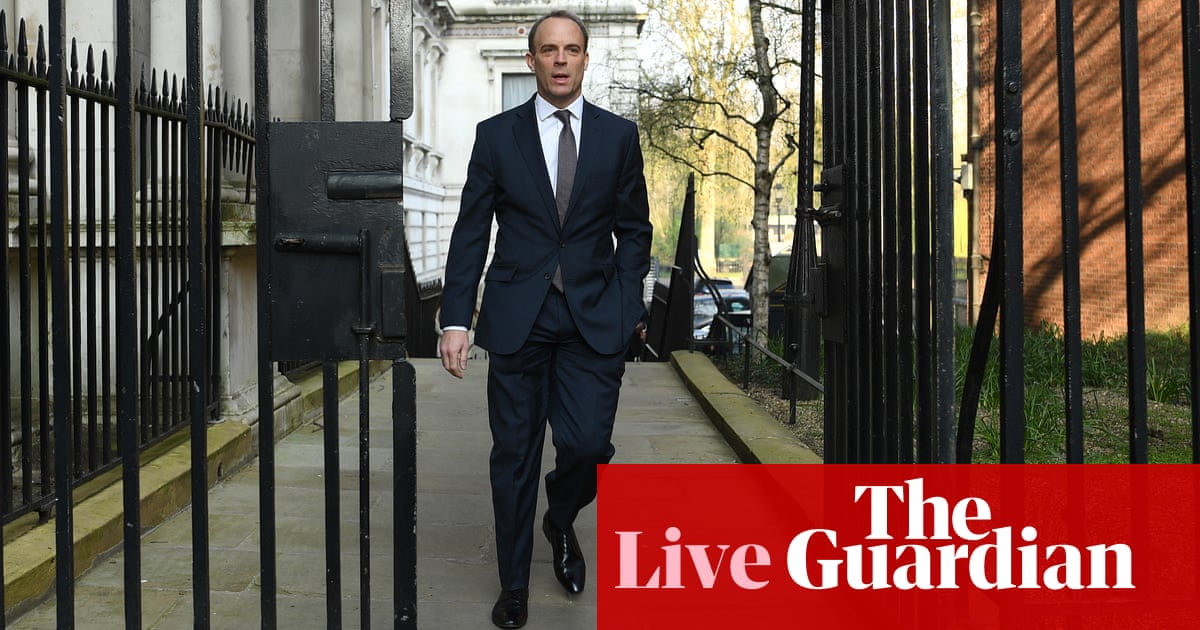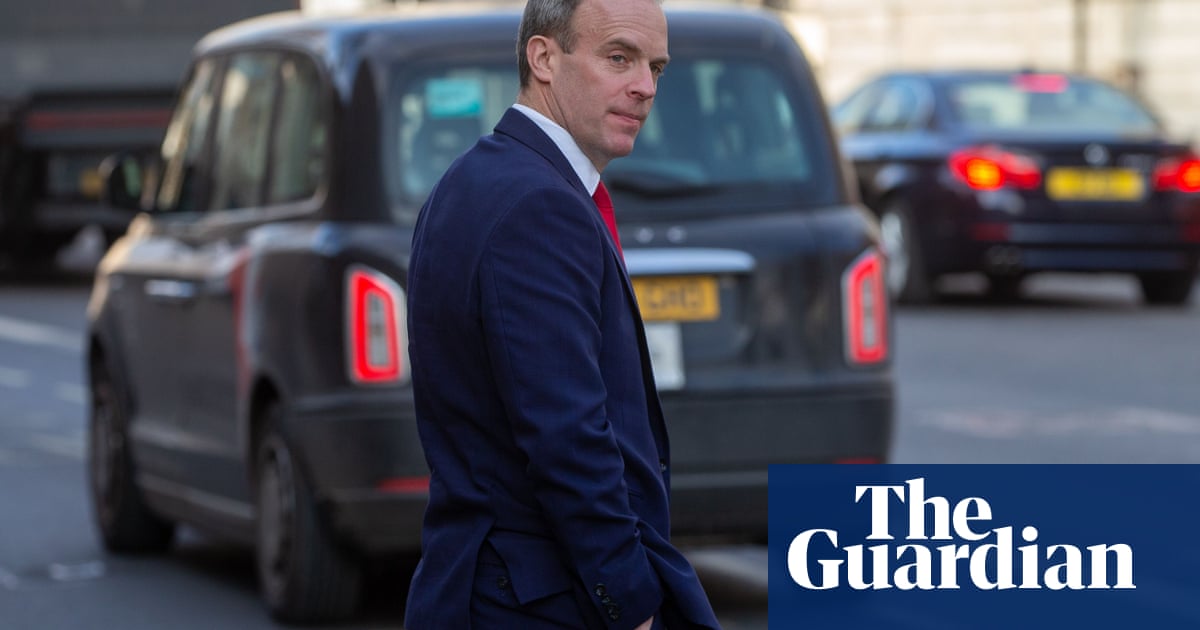
Raab claims "very small minority" of civil servants trying to obstruct government
Dominic Raab has recorded an interview with Chris Mason, the BBC’s political editor. The BBC are about to broadcast it now.
According to a transcript just released, Raab claims a minority of civil servants are trying to obstruct the government. He says:
What you’ve got [is] the risk here [from] a very small minority of very activist civil servants, with a passive aggressive culture … who don’t like some of the reforms, whether it’s Brexit, whether it’s parole reform, whether it’s human rights reform. [They’re] effectively trying to block government …
There’s a little bit of cultural – if you like – aversion. If, actually, they can block reforms or changes through a rather passive aggressive approach, we can’t deliver for the British people.
Raab"s "activist civil servants" claim is "absurd" and inaccurate, says former civil service head
Bob Kerslake, the former head of the civil service, criticised Dominic Raab’s claims of being targeted by “activist civil servants” as “absurd” and inaccurate.
In an interview with BBC Radio 4’s PM programme, Lord Kerslake said: “I think it’s absurd, I think it’s completely inaccurate, and I think it’s just one more line of attack to avoid taking responsibility for his actions.”
Kerslake said he found Raab’s resignation letter to be “pretty graceless” and “in some instances malevolent”.
“He seems to lash out at everybody but doesn’t accept personal responsibility for any of his own behaviour, and I think the issue here he’s trying to turn it into – some kind of constitutional question of good government – simply doesn’t stand up,” he said.
“Every civil servant would accept that ministers have a right to directly oversee negotiations or even to critique advice. What isn’t acceptable is the way he did it,” Kerslake said, adding that the Tolley report was “pretty damning”.
“I don’t know how much clearer [the report] could be about this being about Dominic Raab’s behaviour and not constitutional government,” he said.
Ministers now "very concerned" about facing bullying allegations, says Raab
Dominic Raab said ministers shared concerns about potentially being accused of bullying following the complaints that culminated in his resignation.
“There’ll be a chilling effect, a paralysing effect on ministers,” Raab told GB News. “My phone is lit up now by ministers now very concerned that they could be accused of these things, the behavior that, in most walks of life, would be regarded as important managerial scrutiny.”
Raab alleges "some coordination" between civil servants in bullying complaints
Dominic Raab told GB News there was “some coordination” among civil servants in the bullying complaints made against him.
In response to a question about whether civil servants “coordinated a campaign” to “remove” him, Raab said: “Well, there was certainly some coordination. One of the complaints was struck out because they’d written it together.”
Raab went on to state that the claims, while varying in dates, were all submitted on 15 November, with a few coming “just a little bit later”.
“That can’t be coincidental. But I only know what I know,” Raab said. “And I also know that I was warned by a very senior member of the government, a senior civil servant, that there are increasingly activist civil servants mobilised by the FDA union who are looking to target ministers.”
He added: “But all I know is that I think the bar has been so lowered now that the government we’ve got – and I’m a huge fan and supporter of the prime minister – is going to struggle to drive forward the changes we need.”
Raab claims "tyranny of subjective hurt feelings" could "hold back" senior ministers" work
In his interview with GB News, Dominic Raab spoke of a “tyranny of subjective hurt feelings” that puts senior ministers at risk as they attempt to deliver change to the British public.
The comments came in response to the GB News political reporter Olivia Utley asking Raab whether the bullying allegations were “purely political” or if people felt “genuinely threatened” by him.
“Adam Tolley KC, a very experienced barrister who conducted this investigation, found I’ve never lost my temper, never, over four and a half years, shouted or swore at anyone, but that some people found my direct style of probing, of interrogating, of scrutiny, unsettling or discomforting or even offensive,” he said.
Raab continued:
And I think there’s a certain tyranny of subjective hurt feelings here, which if you actually apply that across the board, means that senior ministers are at risk as they try and drive forward the change that the British public expect, try and protect taxpayers’ money, try and deliver for the British people. It can actually hold things back.
I think if you look at that across the board, and particularly if you compare it to other walks of life, stressful jobs, high-powered businesses, but other walks of life more generally, I think people would be pretty surprised.
The risk, of course, is that it leads government ministers and politicians to look and feel to the public even more detached from reality.
Raab says he is "confident" he "didn’t behave in a bullying way"
Dominic Raab denies having behaved in a “bullying way”, according to his latest interview with GB News.
“Look, I’m very confident that I didn’t behave in a bullying way,” Raab said. “Most of these allegations were dismissed out of hand.”
Raab told GB News:
Being able to pull very senior civil servants up, not junior members of staff, and saying: ‘Look, I don’t have the basic information to decide this,’ that was one of the things on which I was found to have been bullying, because I defended someone.
Or because I said in relation to human rights reform, to get more foreign national offenders removed from this country, to strengthen free speech, I said I thought the department was being obstructive.
If these kinds of things amount to bullying, then I think it puts a handbrake, a paralysing effect, on ministers delivering for the British people, and that can’t be right.
The Guardian’s latest editorial examines Dominic Raab’s departure. In the Guardian’s view, Raab’s resignation “heralds the changing of the guard in the Tory party”.
Here is an excerpt:
Despite being found to have acted in an “intimidating”, “insulting” and “aggressive” way with officials, Mr Raab suggested he was the real victim of a “Kafkaesque saga” in which he had faced an inquisition.
His ungracious resignation letter, written in an apparent fit of pique, played into Brexiters’ permanent sense that their Gulliver was being tied down by Lilliputians in the civil service.
Read more of the Guardian’s take on Raab’s resignation.
Alex Chalk tweeted he is “honoured” to return to the Ministry of Justice following his appointment as justice secretary.
Replacing Dominic Raab in the role indeed signals a justice ministry comeback for Chalk, as he previously held the junior position of parliamentary under-secretary of state for justice from February 2020 to September 2021.
Tensions have spiked between the civil service and politicians following Dominic Raab’s claims of being targeted by “unionised officials” in light of the bullying claims that led to his resignation.
Some former civil servants who worked with Dominic Raab have hit back at the latter’s claims during his BBC interview earlier today, BBC Newsnight reports.
“Raab has often publicly praised the work of his civil servants, so this seems to be at odds with his previous statements and at odds with public statements made by many ministers across a wide range of departments,” one former civil servant said.
Another said that “most civil servants do their jobs because they want to deliver for the public”.
“They do this through a long-standing and normally very effective relationship with the democratically elected ministers,” they said. “I think you’d struggle to find a similar example of the dysfunction we’ve heard about in the report, so it’s perhaps fair to draw the conclusion that there is one common thread to this unique situation - and that’s Raab.”
According to the Express, senior Conservative MPs are unhappy with Rishi Sunak’s handling of the Dominic Raab scandal, perceiving the PM as having failed to support his friend and ally.
The Express quoted an MP as saying: “Dominic was told that the prime minister would not stand by him if he tried to stay on, so he had to resign.”
A former senior minister criticised Downing Street’s “move on” strategy.
“If a minister is going to attract negative publicity it is better for him to go and move on,” the former minister said. “Everything is geared to the prime minister attracting as little negative publicity as possible and not being tied to any problems.”
The senior MP added: “In the end, this is going to come back to bite him, whether it is the consequences of bad policies on things like Northern Ireland, or the betrayed colleagues on the backbenches.”
The term “Rishi ‘no fingerprints’ Sunak” has reportedly circulated among MPs this morning.
Here is Sam Freedman from Prospect responding to Dominic Raab’s argument that ministers can only govern effectively if they are allowed to be robust with civil servants.
That is all from me for tonight. My colleague Danya Hajjaji is now taking over.
In his BBC interview Dominic Raab also refused to commit to standing again as the Conservative candidate in Esher and Walton. He said he wanted to “let the dust settle” before deciding his future.
The fact that Raab did not say yes to standing again in his seat (where the interview was recorded) implies he is either thinking of finding another seat (the Lib Dems are very hopeful of winning Esher and Walton, where they were just 2,743 votes behind at the last election), or thinking of leaving the Commons altogether.
Raab claims public will "pay the price" as result of Whitehall anti-bullying rules for ministers being too strict
Chris Mason opened his interview by asking Dominic Raab if he thought he had been stitched up.
Raab still isn’t putting it quite like that (see 4.43pm), but in his reply he went slightly further than he has before (see 9.57am) in saying Whitehall anti-bullying rules for ministers are too strict. He said the public would “pay the price” because ministers would not be able to govern effectively. Raab told Mason:
Look, I wouldn’t describe it that way. I resigned from cabinet today because I said I would if there was any adverse findings from this inquiry. I’m true to my word – politicians should be – but I do think it sets a very dangerous precedent.
If you look at the Tolley report, it dismissed almost all of the claims against me. It found I’d never once in four and a half years lost my temper, swore and shouted, and things of that nature.
But it also highlighted maybe two or three instances where I’ve been what they described as unintentionally abrasive – whether it was speaking very directly to a senior civil servant who breached the mandate in a very important negotiation, or the language I used was ‘getting basic information’ for a budgetary meeting with hundreds of millions of pounds.
If the bar, the threshold for bullying is low and that low, it’s almost impossible for ministers to deliver for the British people. And I think it will have a chilling effect on effective government, and the British people [will] pay the price.
Raab claims "very small minority" of civil servants trying to obstruct government
Dominic Raab has recorded an interview with Chris Mason, the BBC’s political editor. The BBC are about to broadcast it now.
According to a transcript just released, Raab claims a minority of civil servants are trying to obstruct the government. He says:
What you’ve got [is] the risk here [from] a very small minority of very activist civil servants, with a passive aggressive culture … who don’t like some of the reforms, whether it’s Brexit, whether it’s parole reform, whether it’s human rights reform. [They’re] effectively trying to block government …
There’s a little bit of cultural – if you like – aversion. If, actually, they can block reforms or changes through a rather passive aggressive approach, we can’t deliver for the British people.
In a story for the Telegraph Gordon Rayner says that Rishi Sunak is sympathetic to Dominic Raab’s argument that the threshold for what counts as bullying in Whitehall is now too low (see 10.41am) and that the rules could be changed. Rayner says:
Senior government sources have told The Telegraph that both Mr Sunak and Simon Case, the Cabinet Secretary, have sympathy with Mr Raab’s stance, and believe that civil servants should be “resilient”.
One source suggested Mr Sunak “might change the rules in future” because he agrees with Mr Raab that the bar for the definition of bullying is “too low”.
Raab thinks unintentional bullying should not count as bullying for the purposes of the ministerial code. See 4.16pm.
Here is John Crace’s take on Dominic Raab’s departure.
The former Ukip and Brexit party leader, Nigel Farage, has sided with the argument that Dominic Raab was the victim of a civil service stitch-up. Raab isn’t quite putting it as bluntly as that, but that seems to be what he thinks. (See 12.43pm.)












